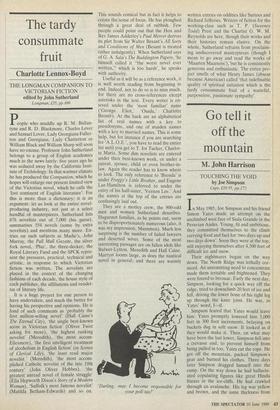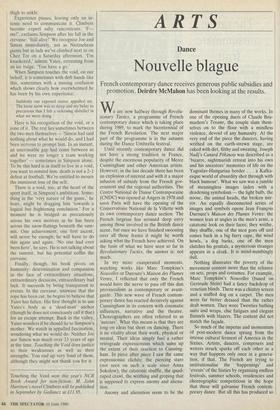Go tell it off the mountain
M. John Harrison
TOUCHING THE VOID by Joe Simpson
Cape, f10.95, pp.172
In May 1985, Joe Simpson and his friend Simon Yates made an attempt on the unclimbed west face of Siula Grande in the Peruvian Andes. Young, fit and ambitious, they committed themselves to the climb carrying food and fuel for 'two days up and two days down'. Soon they were at the top, still enjoying themselves after 4,500 feet of difficult ice and snow.
Their nightmares began on the way down. The North Ridge was lethally cor- niced. An unremitting need to concentrate made them irritable and frightened. They were forced to bivouac. Early the next day, Simpson, looking for a quick way off the ridge, tried to downclimb 20 feet of ice and fell, driving the lower bone of his right leg up through the knee joint. He was, in Yates' word, f—d.
Simpson feared that Yates would leave him: Yates promptly lowered him 3,000 feet in 300 foot increments, belaying on buckets dug in soft snow. It looked as if they would make it. Then, on what may have been the last lower, Simpson fell into a crevasse and, to prevent himself from being pulled in too, Yates cut the rope. He got off the mountain, packed Simpson's gear and burned his clothes. Three days later Simpson dragged himself into the camp. On the way down he had hallucin- ated copulating figures like great Hindu friezes in the ice-cliffs. He had crawled through an avalanche. His leg was yellow and brown, and the same thickness from thigh to ankle.
Experience passes, leaving only an in- tense need to communicate it. Climbers become expert salty ranconteurs. `F--- me!', exclaims Simpson after his fall in the crevasse: 'Still alive!' We recognise Joe and Simon immediately, not as Nietzschean giants but as lads we've climbed next to on Chee Tor on a Saturday afternoon. 'I'm knackered,' admits Yates, retreating from an ice bulge. 'You have a go.'
When Simpson touches the void, on our behalf, it is sometimes with deft hands like this, sometimes with a musing confusion which shows clearly how overwhelmed he has been by his own experience:
Suddenly our exposed stance appalled me. The loose snow was so steep and my belay so precarious that I felt a sickening disbelief in what we were doing.
Here is his recognition of the void, or a zone of it. The rest lies sometimes between the two men themselves — 'Simon had said nothing about what he would do, and I had been nervous to prompt him. In an instant, an uncrossable gap had come between us and we were no longer a team working together' — sometimes in Simpson alone. To be this hard is in itself to live in a void, you want to remind him: death is not a 2-1 defeat at football. We're entitled to mourn the imminent loss of the self.
There is a void, too, at the heart of the sport itself, in Simpson's ambitions. Some- thing in the 'very nature of the game,' he fears, might be dragging him 'towards a logical but frightening conclusion.' For a moment he is bridged as precariously across his own motives as he has been across the snow-flutings beneath the sum- mit. One achievement, one first ascent, will never be enough; he will have to do this again and again. 'No one had ever been here', he says. He is not talking about the summit, but his potential coffin the crevasse.
Finally, though, his book pivots on humanity: determination and compassion in the face of extraordinary situations, extraordinary decisions, extraordinary bad luck. It succeeds by being transparent to events. In the crevasse, unaware that the rope has been cut, he begins to believe that Yates has fallen. His first thought is to use Yates's body as a 'dead-man' anchor (though he does not consciously call it that) for an escape attempt. Back in the valley, Yates wonders if he should lie to Simpson's mother. We watch in appalled fascination, wondering what we would do. Neither Joe nor Simon was much over 23 years of age at the time. Touching the Void does justice to their weaknesses as well as their strengths. You end up very fond of them, although they might not thank you for it.
Touching the Void won this year's NCR Book Award for non-fiction. M. John Harrison's novel Climbers will be published in September by Gollancz at £11.95.



























































 Previous page
Previous page